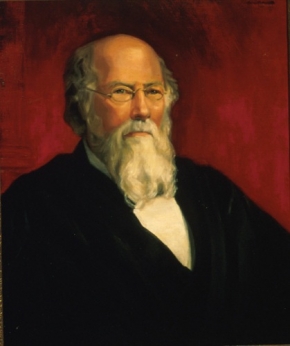You are here
Circuit Court Opinions:
Associate Justice Stephen Johnson Field, Ho Ah Kow v. Nunan (1879)

Ho Ah Kow v. Nunan, 12 F. Cas. 252 (C.C.D. Cal. 1879) (No. 6,546) [Ninth Circuit]
In the late 1870s, the California legislature passed several laws discriminating against Chinese residents in the hope of discouraging further immigration from China. One such statute required dwellings to have at least 500 cubic feet of air for each resident. The law was aimed especially at the Chinese, many of whom lived in crowded homes. When Ho Ah Kow was arrested under the law and did not pay the $10 fine, he was briefly incarcerated. At the jail, the San Francisco sheriff cut off his queue—a long braid of hair, worn by men, which held great significance in Chinese culture. The sheriff acted pursuant to an ordinance of the city and county of San Francisco stating that all men in the county jail were to have their hair cut to within one inch of their scalp.
Ho Ah Kow sued, claiming that the loss of his queue was a mark of shame which had caused him severe emotional distress and alienated him from his community. The question before Justice Field was whether the sheriff’s conduct was justified by the hair ordinance. The plaintiff asserted that the ordinance was invalid because it was beyond the authority of the board of supervisors which enacted it and because it violated the Fourteenth Amendment guarantee of equal protection of the laws.
Field found the ordinance invalid, accepting both of the plaintiff’s arguments. Cutting the hair of prisoners was not justified as a sanitary regulation, he ruled, which would have been the province of the board of health and not the board of supervisors in any event. Instead, the ordinance was clearly a punishment, and municipal authorities lacked the power to add to a punishment devised by the state legislature for violation of a state law. “A treatment to which disgrace is attached, and which is not adopted as a means of security against the escape of the prisoner, but merely to aggravate the severity of his confinement, can only be regarded as a punishment additional to that fixed by the sentence,” he wrote.
Most importantly, Field found the ordinance to violate the Equal Protection Clause of the Fourteenth Amendment. The ordinance was understood by everyone in San Francisco to be aimed at the Chinese, Field stated. In fact, it was generally known as the “Queue Ordinance,” and was not enforced against prisoners who were not Chinese. The board of supervisors itself had said that the purpose of the legislation was to coerce Chinese residents arrested under the cubic air law to pay their fines rather than go to jail. Field rejected the ordinance’s purpose as illegitimate. The stated need for coercion could just as easily be used to justify violent means of torture, he pointed out, which “would accomplish the same end.” Field added that the removal of the queue was a form of torture because it caused the prisoner “disgrace among his countrymen and … the constant dread of misfortune and suffering after death.” The general terms in which the ordinance was written could not save it, Field noted, as the court could not turn a blind eye to facts that were generally known to the public.
In concluding his analysis of the Fourteenth Amendment issue, Field wrote, “It is certainly something in which a citizen of the United States may feel a generous pride that the government of his country extends protection to all persons within its jurisdiction; and that every blow aimed at any of them, however humble, come from what quarter it may, is ‘caught upon the broad shield of our blessed constitution and our equal laws.’”
Field ended his opinion with words sympathetic to those with anti-Chinese sentiments, stating that “thoughtful persons … hope that some way may be devised to prevent [Chinese] immigration.” Nevertheless, he was sharply criticized in the press, which depicted him as pro-Chinese. Field, who held an expansive view of the equal protection guarantee, continued to rule generally in favor of Chinese immigrants alleging violations of their constitutional rights. At the same time, however, he issued notable rulings in support of Chinese exclusion. In Chae Chan Ping v. United States (1889), for example, Field wrote the opinion for a unanimous Supreme Court in upholding the restrictive Scott Act of 1888.
